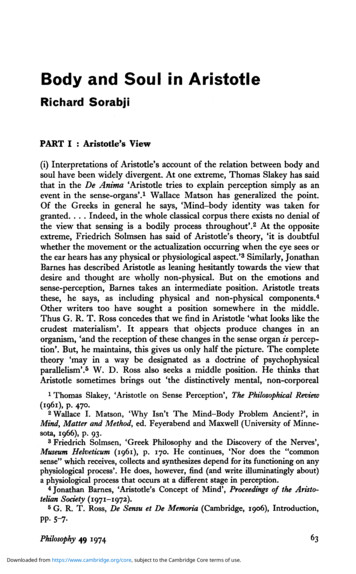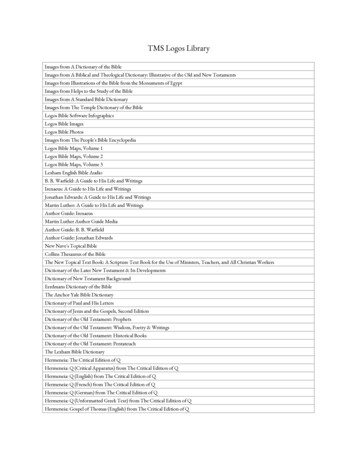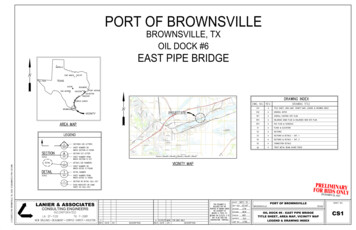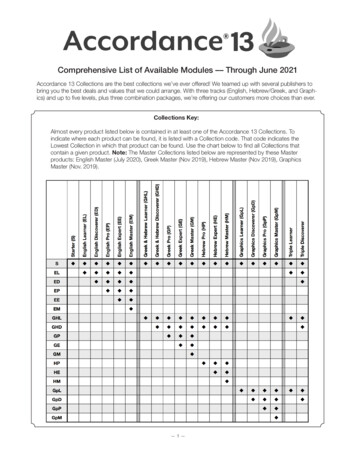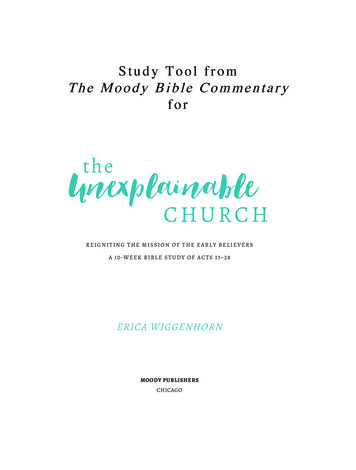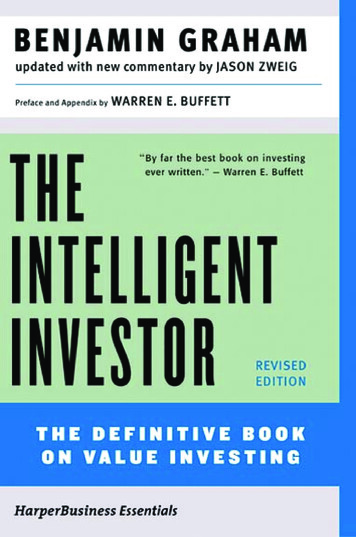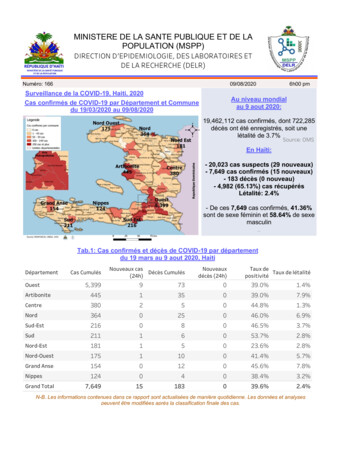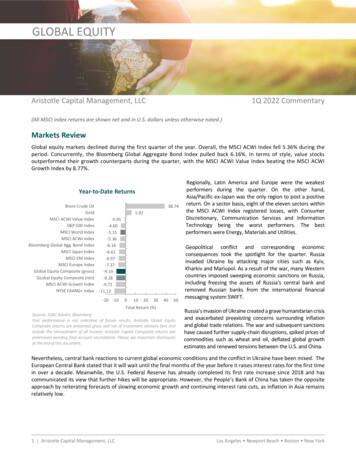
Transcription
GLOBAL EQUITYAristotle Capital Management, LLC1Q 2022 Commentary(All MSCI index returns are shown net and in U.S. dollars unless otherwise noted.)Markets ReviewGlobal equity markets declined during the first quarter of the year. Overall, the MSCI ACWI Index fell 5.36% during theperiod. Concurrently, the Bloomberg Global Aggregate Bond Index pulled back 6.16%. In terms of style, value stocksoutperformed their growth counterparts during the quarter, with the MSCI ACWI Value Index beating the MSCI ACWIGrowth Index by 8.77%.Year‐to‐Date ReturnsBrent Crude OilGoldMSCI ACWI Value IndexS&P 500 IndexMSCI World IndexMSCI ACWI IndexBloomberg Global Agg. Bond IndexMSCI Japan IndexMSCI EM IndexMSCI Europe IndexGlobal Equity Composite (gross)GLobal Equity Composite (net)MSCI ACWI Growth IndexNYSE FAANG ��20 ‐1001020304050Total Return (%)Sources: SS&C Advent, BloombergPast performance is not indicative of future results. Aristotle Global EquityComposite returns are presented gross and net of investment advisory fees andinclude the reinvestment of all income. Aristotle Capital Composite returns arepreliminary pending final account reconiliation. Please see important disclosuresat the end of this document.Regionally, Latin America and Europe were the weakestperformers during the quarter. On the other hand,Asia/Pacific ex‐Japan was the only region to post a positivereturn. On a sector basis, eight of the eleven sectors withinthe MSCI ACWI Index registered losses, with ConsumerDiscretionary, Communication Services and InformationTechnology being the worst performers. The bestperformers were Energy, Materials and Utilities.Geopolitical conflict and corresponding economicconsequences took the spotlight for the quarter. Russiainvaded Ukraine by attacking major cities such as Kyiv,Kharkiv and Mariupol. As a result of the war, many Westerncountries imposed sweeping economic sanctions on Russia,including freezing the assets of Russia’s central bank andremoved Russian banks from the international financialmessaging system SWIFT.Russia’s invasion of Ukraine created a grave humanitarian crisisand exacerbated preexisting concerns surrounding inflationand global trade relations. The war and subsequent sanctionshave caused further supply‐chain disruptions, spiked prices ofcommodities such as wheat and oil, deflated global growthestimates and renewed tensions between the U.S. and China.Nevertheless, central bank reactions to current global economic conditions and the conflict in Ukraine have been mixed. TheEuropean Central Bank stated that it will wait until the final months of the year before it raises interest rates for the first timein over a decade. Meanwhile, the U.S. Federal Reserve has already completed its first rate increase since 2018 and hascommunicated its view that further hikes will be appropriate. However, the People’s Bank of China has taken the oppositeapproach by reiterating forecasts of slowing economic growth and continuing interest rate cuts, as inflation in Asia remainsrelatively low.1 Aristotle Capital Management, LLCLos Angeles Newport Beach Boston New York
Quarterly Commentary – Global EquityPerformance and Attribution SummaryFor the first quarter of 2022, Aristotle Capital’s Global Equity Composite posted a total U.S. dollar return of ‐9.19% gross offees (‐9.28% net of fees), compared to the MSCI World Index, which returned ‐5.15%, and the MSCI ACWI Index, whichreturned ‐5.36%. Please refer to the table below for detailed performance.Performance (%)1Q221 Year3 Years5 Years10 YearsSince Inception*Global Equity Composite (gross)‐9.191.7514.4212.2811.2010.75Global Equity Composite (net)‐9.281.4114.0411.8910.7510.30MSCI World Index (net)‐5.1510.1214.9612.4210.8810.44MSCI ACWI Index (net)‐5.367.2813.7411.649.999.50*The inception date for the Global Equity Composite is November 1, 2010. Past performance is not indicative of future results. Returns are presented gross andnet of investment advisory fees and include the reinvestment of all income. Aristotle Capital Composite returns are preliminary pending final accountreconciliation. Please see important disclosures at the end of this document.Total Contribution to Relative Return by Sectorversus MSCI World IndexFirst Quarter 2022Communication Services0.67Consumer Discretionary‐0.92Consumer Staples‐0.02Energy‐0.31Financials0.38Health Care0.08IndustrialsInformation nderperformance relative to the MSCI World Index canbe attributed to security selection, while allocation effectshad a positive impact. Security selection in InformationTechnology, Industrials and Materials detracted the mostfrom the portfolio’s relative performance. Conversely,security selection in Communication Services andFinancials and an overweight in Materials contributed torelative return.Regionally, security selection was primarily responsible forthe portfolio’s underperformance relative to the MSCIWorld Index, while allocation effects also had a negative,albeit significantly smaller, impact. Security selection inNorth America and Europe detracted the most fromrelative performance, while security selection and anoverweight in Asia/Pacific ex‐Japan contributed.‐1.28‐1.61Materials‐0.66Real .0Total Contribution to Relative Return (%)Source: FactSetPast performance is not indicative of future results. Attribution results arebased on sector returns, which are gross of investment advisory fees andinclude the reinvestment of all income. Please see important disclosures at theend of this document.Contributors and Detractors for 1Q ral DynamicsPayPal HoldingsLennar, one of the nation’s largest homebuilders, was a primarydetractor for the quarter. The combination of rising home valuesKDDIRationaland higher mortgage rates in the U.S. has reducedAmgenNemetschekhomeownership affordability, causing concern of a slowdown inthe housing market. While we recognize higher mortgage ratesreduce affordability, we also recognize there is a supply deficit caused by nearly 10 years of new home construction laggingdemand. Despite rising construction and land costs, Lennar’s profitability has increased, with the company’s year‐over‐yearhome sales gross margin expanding 190 basis points to 26.9%. First‐quarter new orders and home deliveries also exceededmanagement’s expectations, and the firm raised its home delivery target for fiscal year 2022. With increased FREE cash flowas both margins and volume increased, Lennar continued to buy back shares, and the Board approved a 50% increase in the2 Aristotle Capital Management, LLC
Quarterly Commentary – Global Equityannual dividend, as well as an additional 2 billion stock repurchase authorization (over 8% of the current market cap).Lennar’s conservative capital allocation and prudent inventory management have allowed, and we believe will continue toallow, the company to overcome higher interest rates.Cameco, the world’s largest publicly traded uranium producer, was a primary contributor for the quarter. After years ofstringent operational discipline that included production cuts, inventory reduction and market purchases, the company hasreported strengthening market fundamentals, as industry‐wide supply concerns continue to abate. The improving conditionscan provide Cameco significant leverage to drive higher prices under its market‐related contracts. Moreover, the companyhas obtained 70 million pounds of additional long‐term contracts since the beginning of 2021, demonstrating Cameco’s strongposition to capture increasing demand. Nevertheless, management has reiterated its commitment to maintaining supplydiscipline while continuing to invest in operational efficiency through automation, digitization and training. As such, thecompany expects to see significant improvements in cash flow generation, as it ramps up to its 2024 planned productioncapacity. We believe Cameco’s disciplined approach and conservative financial management continue to reinforce its long‐term position and its ability to return value to shareholders. This was recently demonstrated when Cameco’s board approveda 50% increase to the company’s annual dividend for 2022.Recent Portfolio ActivityDuring the quarter, we sold our investments in Axalta CoatingSystems, Bank of America, Chubb, Dassault Systèmes andWalgreens Boots Alliance and invested in Brookfield AssetManagement, Dolby Laboratories, FMC and Michelin.Although we were more active than normal this quarter, wewant to stress that this is not a reaction to the currenteconomic conditions. All portfolio activity is a reflection of ourunderlying investment philosophy and process.BuysSellsBrookfield Asset ManagementAxalta Coating SystemsDolby LaboratoriesBank of AmericaFMCChubbMichelinDassault SystèmesWalgreens Boots AllianceWe became owners of Axalta, a coatings provider primarilyto the auto industry, in the third quarter of 2016. During our more than five‐year holding period, the company has successfullyenhanced its FREE cash flow through cost reductions and low requirements of maintenance capital expenditures. It has used thiscash to, in part, participate in further industry consolidation. The company has battled supply chain headwinds in recent years,but we still think highly of Axalta’s competitive advantages, which include its scale, pricing power and strong OEM relationships.However, we decided Axalta was the best candidate for sale to fund what we believe is a more attractive investment in FMC. Inaddition, given this quarter’s purchase of Michelin, we thought it prudent to balance our exposure to the auto industry.We first invested in Bank of America during the second quarter of 2013. During our near decade as investors, Bank of Americaclosed the chapter on the legacy issues from acquired Countrywide, including mortgage write‐downs and substantial legalcharges. In addition, it successfully turned the Merrill Lynch franchise into one of the leading U.S. brokerage and advisory firms.Thanks to what we consider to be a strong management team led by CEO Brian Moynihan, the bank went through years ofsimplification, improved its cost structure and efficiency ratio, and reduced risk. While we believe Bank of America remains amuch‐improved market leader, we decided to exit our position and use the proceeds to invest in Brookfield Asset Management.Our investment in Chubb began in the fourth quarter of 2015, shortly after ACE Limited announced it would acquire the ChubbCorporation, creating the largest global property and casualty insurance company by underwriting income. During our nearlyseven‐year holding period, the company’s combination progressed leading to the realization of main catalysts we had identified.These included cost savings, broadened product offerings and an expanded customer base, as well as enhanced distributioncapabilities and improved pricing due to scale. In addition, Chubb successfully grew its profitable high‐net‐worth personal lines.While we still consider Chubb to be a high‐quality business, few catalysts remain after what was, in our opinion, a remarkablerun of successful business execution. As such, we decided to step aside in favor of what we believe to be a more optimalinvestment in Blackstone.We have owned Dassault for the better part of a decade, having invested in this business for our Global Equity portfolios inthe third quarter of 2014. With 90% of all aircraft and 80% of all autos globally made via Dassault software, we believe thecompany will stay well entrenched in engineering teams. Catalysts still developing include continued adoption of its3DExperience platform, which connects much of Dassault’s offerings in one place. In our view, this will further drive alreadysignificant switching costs and network effects, allowing the business to increase its platform revenue. As such, we continue3 Aristotle Capital Management, LLC
Quarterly Commentary – Global Equityto own the company in our International Equity portfolios. However, we made the decision to sell Dassault in our GlobalEquity portfolios to fund what we believe to be a more optimal investment in U.S.‐based Dolby Laboratories.We first invested in Walgreens Boots Alliance in early 2013. Over our holding period, Walgreens merged with U.K.‐basedBoots Alliance, establishing itself as a global leading retail pharmacy chain. CEO Stefano Pessina set the company on a pathof pursuing strategic partnerships (as opposed to vertical integration deals) to increase store traffic and to, over time,transform the business into a neighborhood health destination around a more modern pharmacy. Using its strong FREE cashflow generation, the company ramped up its investments in technology, aiming to accelerate the digitalization of healthinformation. Mr. Pessina was not successful, however, at turning around the firm’s U.S. retail segment and had to deal withincreasing prescription drug reimbursement pressures. He stepped down as CEO in 2020, and in 2021, Roz Brewer took thereins of the firm. We admire Ms. Brewer’s impressive track record at companies that include Starbucks and Walmart (Sam’sClub). However, given management’s decision to divest core cash‐generative businesses and redeploy capital to embryonichealthcare startups, we prefer to step aside while we follow the company’s progress.Brookfield Asset Management, Inc.Canada‐based Brookfield Asset Management is one of the largest and most diversified private market investors in the world.With 690 billion in assets under management (AUM), Brookfield is an owner and operator of infrastructure (19% of fee‐earning AUM), real estate (17%), renewable energy (15%), private equity (6%), public securities (4%) and, more recently,credit (39%) by acquiring a majority interest in Oaktree Capital Management. In addition to managing client assets, it investscapital from its own balance sheet alongside outside investors. And though Brookfield is a new purchase for our Global Equityportfolios, we have been owners of Brookfield in our International Equity portfolios for more than a decade.Brookfield has a differentiated investing approach from many by taking on the challenge of improving operations at thecompanies it owns, with less of an emphasis on altering capital structures. The investments Brookfield targets are ones theyconsider to be high‐quality assets under the surface but have otherwise run into significant operational headwinds, such aspoor management or tough industry dynamics. This can allow Brookfield to purchase assets at attractive valuations andsubsequently work to improve them operationally.The foundation of Brookfield’s investing platform is traditional private drawdown funds from which it earns management andperformance fees. In addition, Brookfield has partial ownership in four publicly traded investment vehicles from which itearns fees for managing the investments and pro‐rata distributions of corporate profits.High‐Quality BusinessSome of the quality characteristics we have identified for Brookfield include: Strong positioning from its scale and brand power, being either a leader in its respective asset classes (real estate,infrastructure, renewable energy, distressed credit) or nimble enough in more competitive markets to meaningfullyexpand (private equity); Skilled management with a long history of operating expertise, which we view as a competitive advantage in biddingfor deals and generating superior investment returns; and Demonstrated, stable cash flows from long‐term fee streams, as more than half of its capital is locked up for morethan 10 years.Attractive ValuationShares of Brookfield are priced at a discount relative to our estimates of intrinsic value. On a normalized basis, it is our viewthat earnings will be greater than what is currently assumed by the market.Compelling CatalystsCatalysts we have identified for Brookfield, which we believe will cause its stock price to appreciate over our three‐ to five‐year investment horizon, include: Owing to its quality assets and efficiently run structure, Brookfield is well‐situated to take advantage of thecontinued institutional shift toward real assets; High demand for capital in renewable energy feeds into Brookfield’s competencies and market position. Very fewcompetitors have both the scale and expertise to capitalize on this trend;4 Aristotle Capital Management, LLC
Quarterly Commentary – Global Equity Brookfield’s recognized leadership and experience investing in infrastructure can provide a strong competitiveadvantage to bid and operate assets that are increasingly sold by governments to pay down debt; and Improved penetration in retail channels, as Brookfield’s scale can provide a distinct advantage in this still largelyuntapped market for alternative managers.Dolby Laboratories, Inc.Founded in 1965 and headquartered in San Francisco, Dolby Laboratories designs and manufactures audio and visual products.Its technology makes images brighter, colors further refined and the audio experience more immersive by providing an enhancedability to pinpoint the placement and volume of specific sounds. Products that utilize Dolby’s technology span both commercialand home theaters, televisions, sound bars, computers and mobile devices.The company partners with music artists, movie directors and other content creators, teaching them how to properly leverageDolby’s suite of products to create next‐generation productions. Dolby generates revenue by licensing its technologies tosoftware vendors and over 500 electronics manufacturers, the likes of which include Sony, Microsoft, Samsung and Apple.The company’s end markets consist of Broadcast (39% of licensing revenue), Mobile (22%), Consumer Electronics (15%), PC(12%) and Other (12%).High‐Quality BusinessSome of the quality characteristics we have identified for Dolby Laboratories include: Decades‐long market leadership in a near‐monopolistic environment, as Dolby’s technologies are widely consideredindustry standards. For example, Dolby has won the format war in spatial audio with Dolby Atmos and for hi‐def withDolby Vision; Pricing power and “sticky” customers, since licensing for Dolby’s technology represents a very low percentage of aproduct’s total cost but is critical to a customer’s buying decision; and Its 10,000 patents, the very complex nature of its technology and its already firmly in place network effects createhigh barriers to entry for would‐be competition.Attractive ValuationWe believe shares of Dolby Laboratories are undervalued by the market given our estimates of higher normalized FREE cashflow from expanded adoption of its product suite and growing addressable market.Compelling CatalystsCatalysts we have identified for Dolby Laboratories, which we believe will cause its stock price to appreciate over our three‐to five‐year investment horizon, include: Continued market share gains for Dolby Atmos and Dolby Vision, as more OEMs prioritize quality of sound andvisuals in devices (TVs, phones, headsets, tablets, PCs, videogames, etc.); and Further adoption of Dolby.io, a platform that enables software developers to improve audio files and enhancecommunications experiences within their applications. Dolby.io has already seen a climb in use cases acrossentertainment, online education and telehealth.FMC CorporationFMC is an agricultural sciences company providing solutions for the protection of crops from different pests. Its productsare used by farmers to ensure bugs, weeds and fungi do not negatively impact their harvest. Headquartered inPhiladelphia, Pennsylvania, the company has a rich history dating back to 1883 when inventor John Bean set out to builda better insecticide spray pump. Over the decades, through acquisitions, FMC became a disparate collection of chemicalcompanies. FMC has transformed itself to solely focus on crop chemicals, having acquired DuPont’s crop chemicalsportfolio in 2017, and completed the separation of its lithium business in 2019. FMC is now one of the largest patentedcrop protection companies globally.Its presence is balanced both geographically around the world, as well as from a crop exposure standpoint, with soybeans beingthe largest at roughly 20% of total revenue. In terms of products, FMC’s portfolio skews toward insecticides, which account forover 60% of its revenue. The remainder are herbicides ( 25%), as well as fungicides and other crop chemicals ( 15%).5 Aristotle Capital Management, LLC
Quarterly Commentary – Global EquityHigh‐Quality BusinessSome of the quality characteristics we have identified for FMC include: Strong portfolio of brands allowing for differentiation outside of price, as many customers refer to the brand name,not the active ingredient; Strong competitive position with many products being either protected by patents or niche products, perhapsunlikely to be targeted by generics; Oligopolistic industry, as FMC is one of just five companies that collectively contribute the majority of research anddevelopment performed on crop protection chemicals; and Capable management team with operational experience and ability to commercialize new products.Attractive ValuationWe believe FMC’s current stock price is offered at a discount to our determination of the company’s intrinsic value given ourestimates of both enhanced margins and higher earnings on a normalized basis.Compelling CatalystsCatalysts we have identified for FMC, which we believe will cause its stock price to appreciate over our three‐ to five‐yearinvestment horizon, include: FMC is poised to benefit from its focus on crop chemicals, as yield gains are needed to support rising foodconsumption in emerging markets; Continued margin improvements from its product pipeline. These new products should be particularly effectiveagainst insects, weeds and fungi that have grown resistant to traditional crop chemicals; and Further cross‐selling of FMC products to DuPont customers. For example, in Argentina, 78% of the customers itgained from the DuPont acquisition were unique to FMC, providing cross‐selling opportunities.Compagnie Générale des Établissements MichelinFounded in 1889, Compagnie Générale des Établissements Michelin (Michelin) is a France‐based tire manufacturer. With 126research and production facilities, over 7,600 dealerships, and sales representatives across 171 countries, the company hasestablished itself as the second‐largest tire manufacturer in the world.Michelin designs and manufactures automotive ( 50% of revenue – Automobiles), road transportation ( 25% – Trucks) andspecialty tires ( 25% – Mining, Aircraft, Off‐the‐Road, etc.) for various customers and end markets. With over a century ofoperational history, the company’s dedication to innovation and efficiency has made Michelin an industry leader.High‐Quality BusinessSome of the quality characteristics we have identified for Michelin include: Global scale and market‐leading position with 14% share of all global tire sales; One of the world’s most iconic brands and mascots, the “Michelin Man;” Robust profitability driven by the company’s expertise in large diameter tires and the higher‐margin specialty tiressegment; and Consistency in earnings power relative to the overall auto industry due to the critical need for tires.Attractive ValuationGiven our estimates of normalized earnings, we believe Michelin’s current stock price is offered at a discount to our estimateof the company’s intrinsic value. Specifically, we believe various initiatives will lead to higher market share and normalizedmargins for the business.Compelling CatalystsCatalysts we have identified for Michelin, which we believe will cause its stock price to appreciate over our three‐ to five‐year investment horizon, include: Improvements to profitability from product mix shifts toward larger diameter and specialty tires;6 Aristotle Capital Management, LLC
Quarterly Commentary – Global Equity More efficient management of SG&A through initiatives such as process enhancements and simplifications,deployment of the company’s business management program, and digitization of HR and CRM platforms; and Further progress on the company’s four‐pronged growth plan (i.e., improve market share and profitability throughproduct innovation of tires; provide unique mobility experiences through maps, guides and digital services; deepenunderstanding of customer needs to offer best‐in‐class services and solutions; and leverage expertise in high‐techmaterials to create sustainable products and expand in high‐potential growth markets).ConclusionPerformance for the first few months of 2022 has undoubtedly been disappointing. However, in both strong short‐termperiods and weak ones, we are resolute in our mantra — “not every quarter, not every year.” Down markets and short‐termprice swings are a natural part of investing. While issues such as inflation, interest rates, war and trade relations will certainlypersist in the coming quarters, we remain focused on what, in our opinion, is analyzable. As such, while we are ever cognizantof the events and environment around us, we will always choose to instead concentrate on the long‐term fundamentals ofthe businesses we study. We believe our approach of understanding companies’ earnings power from a normalizedperspective, combined with our focus on high‐quality, undervalued businesses that possess significant catalysts, is the bestway to create lasting long‐term value for our clients.7 Aristotle Capital Management, LLC
Performance & DisclosuresAristotle Global Equity Composite PerformanceAll Periods Ended March 31, 20222014.421514.0414.9613.7412.2810.12Returns (%)1011.8912.42 11.6411.2010.75 10.88 9.9910.75 10.30 10.449.507.2851.751.410‐5‐5.15 ‐5.36‐10‐9.19 ‐9.28‐15QTD1 YearGlobal Equity Composite (Gross)3 Years5 Years10 YearsGlobal Equity Composite (Net)MSCI World Index (Net)Since Inception(11/1/2010)MSCI ACWI Index (Net)YearGlobal Equity Composite(Gross %)Global Equity Composite(Net %)MSCI WorldIndex (Net %)MSCI ACWIIndex (Net %)2022 ‐7.3511/1/10 – 12/31/104.654.565.034.93Supplemental Performance1/1/10 – 08‐38.12‐39.54‐40.71‐42.197/1/07 – 12/31/07‐2.30‐3.31‐0.121.62Composite returns for all periods ended March 31, 2022 are preliminary pending final account reconciliation.The performance information presented is based on the Aristotle Global Equity Composite. Past performance is not indicative of future results. Performanceresults for periods greater than one year have been annualized. Returns are presented gross and net of investment advisory fees and include the reinvestmentof all income. Please see important disclosures within this document.8 Aristotle Capital Management, LLC
Performance & DisclosuresDISCLOSURES:The opinions expressed herein are those of Aristotle Capital Management, LLC (Aristotle Capital) and are subject to change without notice.Past performance is not a guarantee or indicator of future results. This material is not financial advice or an offer to buy or sell any product.You should not assume that any of the securities transactions, sectors or holdings discussed in this report were or will be profitable, or thatrecommendations Aristotle Capital makes in the future will be profitable or equal the performance of the securities listed in this report.The portfolio characteristics shown relate to the Aristotle Global Equity strategy. Not every client’s account will have these characteristics.Aristotle Capital reserves the right to modify its current investment strategies and techniques based on changing market dynamics or clientneeds. There is no assurance that any securities discussed herein will remain in an account’s portfolio at the time you receive this reportor that securities sold have not been repurchased. The securities discussed may not represent an account’s entire portfolio and, in theaggregate, may represent only a small percentage of an account’s portfolio holdings. The performance attribution presented is of arepresentative account from Aristotle Capital’s Global Equity Composite. The representative account is a discretionary client account whichwas chosen to most closely reflect the investment style of the strategy. The criteria used for representative account selection is based onthe account’s period of time under management and its similarity of holdings in relation to the strategy. Recommendations made in thelast 12 months are available upon request.Returns are presented gross and net of investment advisory fees and include the reinvestment of all income. Gross returns will be reducedby fees and other expenses that may be incurred in the management of the account. For example, a 0.5% annual fee deducted quarterly(0.125%) from an account with a ten‐year annualized growth rate of 5.0% will produce a net result of 4.4%. Actual performance results willvary from this example.The MSCI World Index is a free float‐adjusted market capitalization weighted index that is designed to measure the equity marketperformance of developed markets. The MSCI World Index consists of the following 23 developed market country indices: Australia, Austria,Belgium, Canada, Denmark, Finland, France, Germany, Hong Kong, Ireland, Israel, Italy, Japan, Netherlands, New Zealand, Norway, Portugal,Singapore, Spain, Sweden, Switzerland, the United Kingdom and the United States. The MSCI Emerging Markets Index is a free float‐adjusted market capitalization‐weighted index
Our investment in Chubb began in the fourth quarter of 2015, shortly after ACE Limited announced it would acquire the Chubb Corporation, creating the largest global property and casualty insurance company by underwriting income. . In addition, Chubb successfully grew its profitable high‐net‐worth personal lines. While we still consider .
